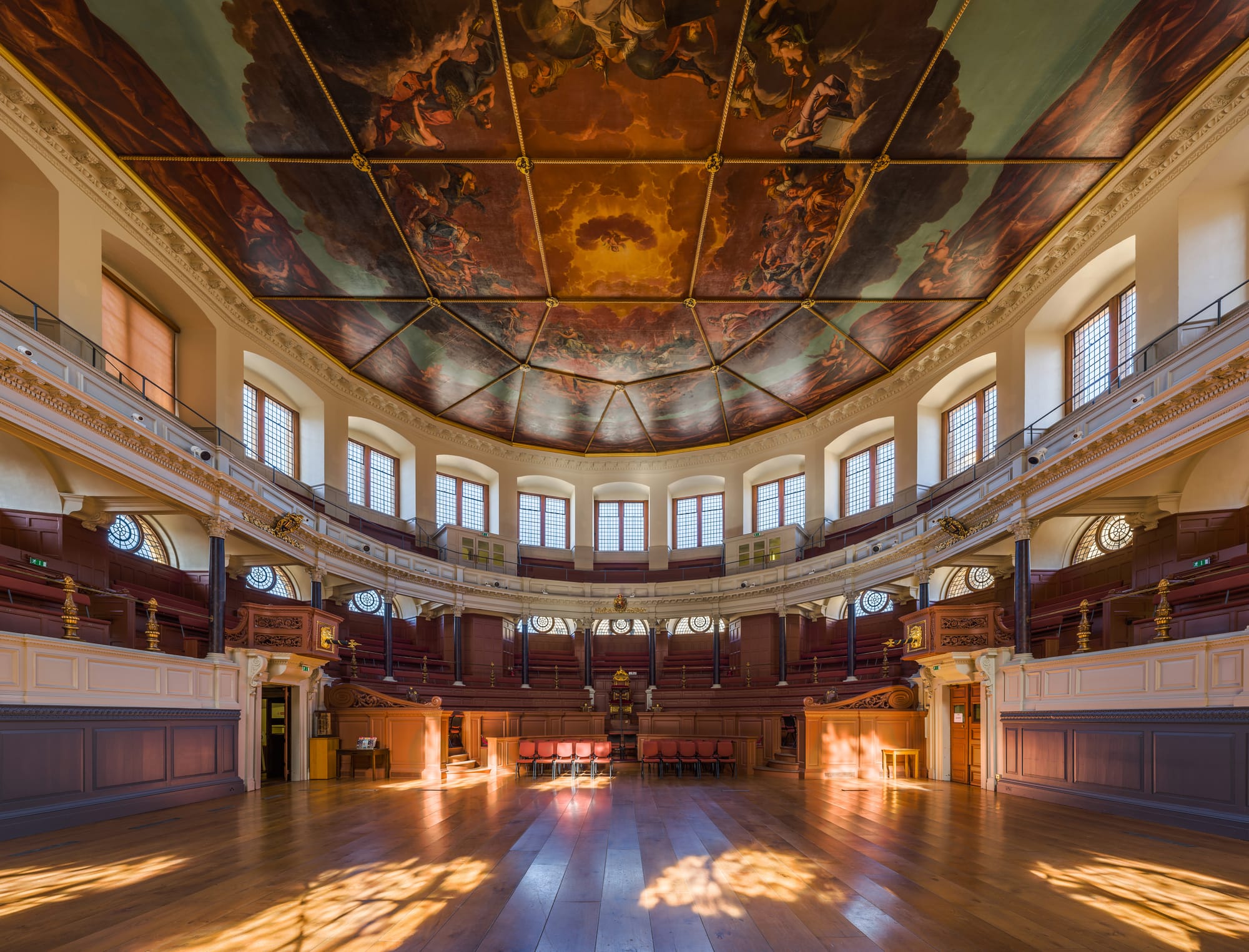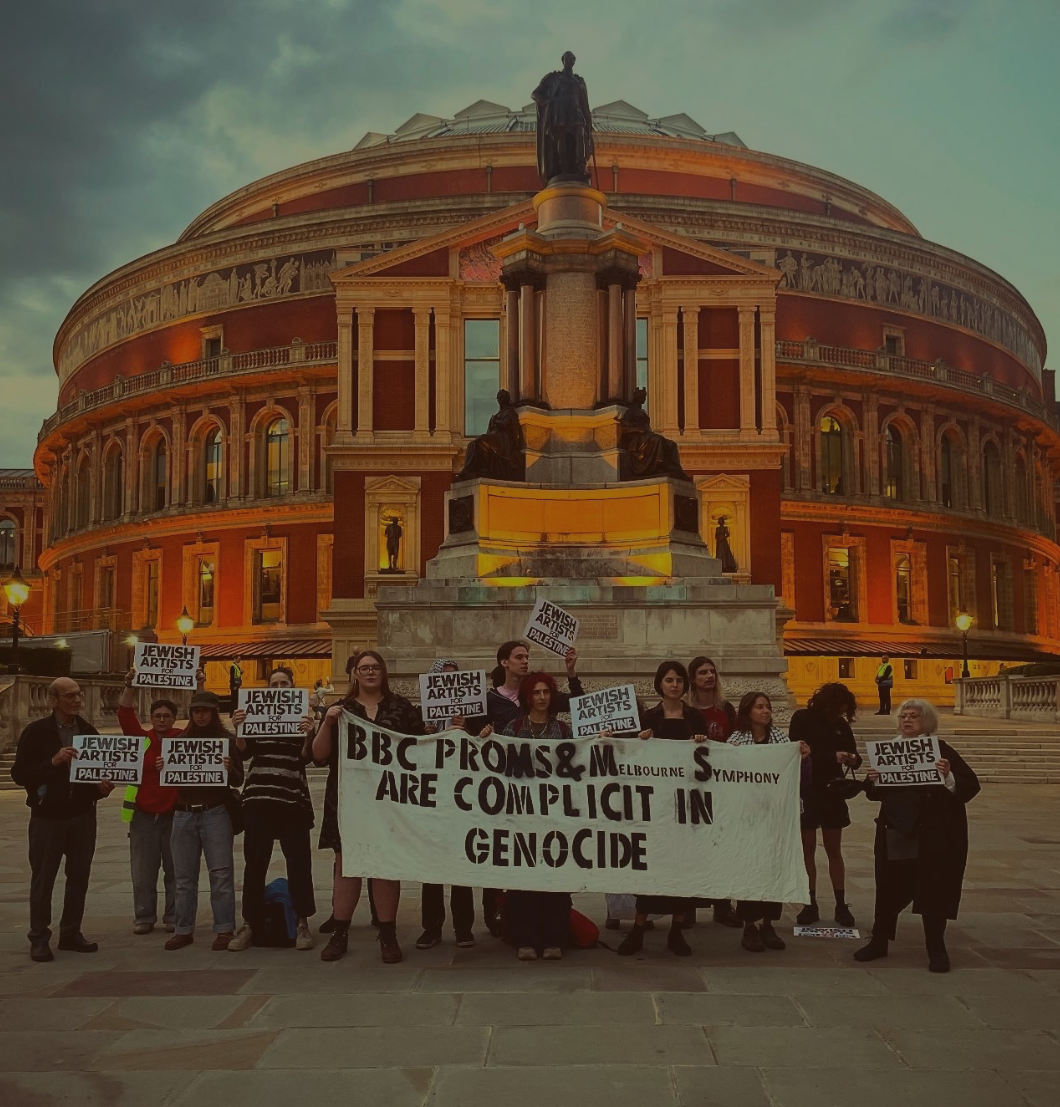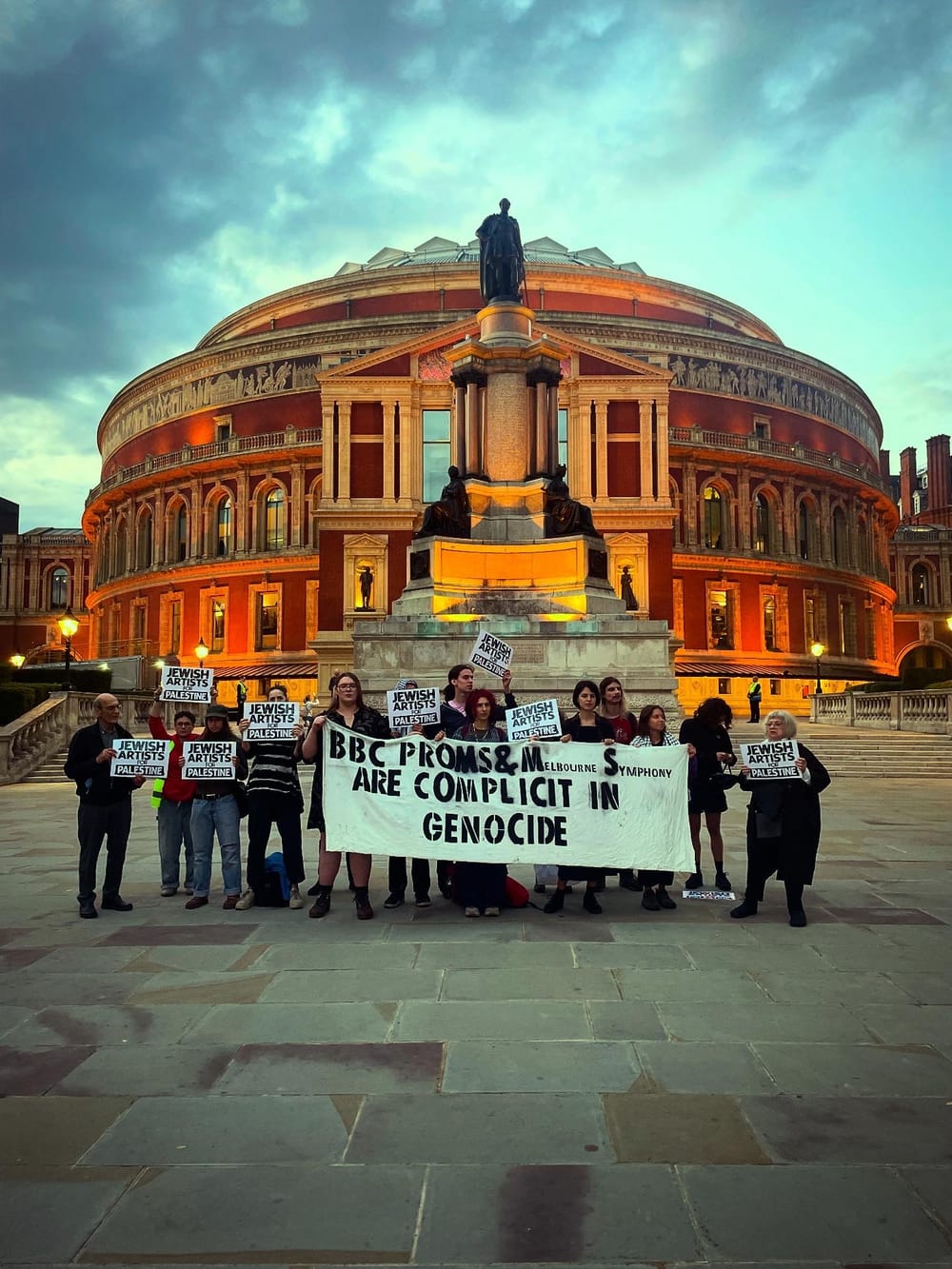How the Oxford Literary Festival became a haven for the right
Behind the liberal festival facade, the OLF is providing a platform for the right-wing Free Speech Union and cashing in on culture wars – and it's not alone.

In December 2024, the Oxford Literary Festival (OLF) announced one of the flagship events of their 2025 programme: a talk between Helen Joyce and Julie Bindel titled “Trans: Gender Identity & the New Battle for Women’s Rights”. The talk, held on 2 April in front of a sold-out audience, was one of 37 events hosted this year in the Sheldonian Theatre – the festival’s largest and most prestigious venue.
The event billed itself as Joyce “offer[ing] an analysis of a world in which biological sex is no longer accepted as a fact of life”, alongside several other soft-touch euphemisms about her views (Joyce campaigns for “clarity about the two sexes”, apparently). Several speakers pulled out of the festival as a result, including author Noreen Masud, who posted on Instagram that Joyce and Bindel are “two authors who make their money by vilifying and dehumanising trans people.”
As I have written about for Vashti previously, the anti-trans nonfiction industry has a robust network of friends in UK publishing, journalism, and academia. Literary festivals, however, tend to be averse to inflammatory and controversial books of any kind, unless those books can successfully market themselves otherwise. I was, therefore, inquisitive about this talk’s existence, in addition to how it was framed: the event description stated that the discussion would revolve around Joyce’s “Sunday Times bestselling book on the transgender debate” – Trans: When Ideology Meets Reality, which was published in 2021.
When literary festival events focus on a specific book, it’s invariably a release from the previous or current year, with the exception of the occasional big anniversary. They don’t cover books from four years ago. (Bindel’s latest book is also from 2021.) Plus, according to sympathetic Spectator writer Jenny Lindsay, this was “Joyce’s first ever book festival booking”, indicating that it was a rare example of an event configured as a kind of redress to wider festival culture.
Literary events uncomfortably naturalising anti-trans speech is one thing; this was a deliberate attempt to stoke, and cash in on, trans “culture war” provocation and to celebrate its legitimation in UK culture, in a way that altered the logics of the festival itself.
This was not an incongruous one-off event, but a key part of a festival-wide rebrand. The OLF is marketing itself as a harbour of free speech, mainly through the vehicle of “debates” about provocative political issues: immigration, “wokeness”, fascism, the idea of “broken Britain”, trans rights. It has also recently partnered with The Telegraph, whose coverage of these “both-sides” debates noticeably favours one side.
None of this is new, at festivals or otherwise – free-speech enthusiasts may have come across the Battle of Ideas festival, now entering its 20th year – but it is a concerning development in the UK literary landscape, and one that has gone almost entirely unnoticed, even among those who have criticised the Joyce-Bindel talk. Given Joyce’s role as Director of Advocacy at Sex Matters, and Sex Matters’ key role as an intervener in the recent Supreme Court judgment about “biological sex”, it is more imperative than ever to excavate the safe, seemingly neutral havens that are granting resources and platforms to these people.
Political beginnings
Literary festivals worldwide are caught up in culture-war furores that usually relate, directly or indirectly, to Israel’s bombing of Gaza. In Australia, several resignations have stemmed from the desire to protect the neutrality of Zionist ideas within liberal festival contexts.
The Sydney Writers’ Festival chair resigned in February 2025 over a perceived lack of “balance” of views “on matters such as the Israel-Gaza war”, while the deputy chair of the Melbourne Writers’ Festival resigned in 2024 over a programme description of an Aboriginal Australian and Palestinian poetry event, which he reportedly felt “rejected the Jewish connection to the land covered by the state of Israel” through using the word “colonialism”.
Politesse has become difficult to maintain in the midst of a brutal, internationally recognised genocide; festival liberalism is prone to fracture as a result.
Meanwhile, in the UK, a quiet factionalism has developed over Fossil Free Books’ divestment campaign from Baillie Gifford – centred around fossil fuels and Israeli occupation – and Baillie Gifford’s subsequent withdrawal of funding from UK literary festivals. The leftist, anti-Zionist, anti-fossil-fuels, pro-trans-rights, pro-diversity “activist” has been disingenuously placed in opposition to the pragmatics of financing the arts; this, of course, lends credence to the idea that the struggling festival needs the right to save it.
But the literary festival has never been a drowning damsel in need of intervention; it has been a political institution since the beginning, and courting controversy has, at times, been a key part of its business model.
In the heart of sleepy Oxford
The OLF has been around for a while, but not quite long enough to be an institution. Its website claims that the festival is in its 30th anniversary year this year, but I found a handful of citations for a 1997 or 2001 founding date; take your pick. It’s not significant, except as it relates to the OLF’s appeal to its own blurry history.
The OLF’s website includes a prominently displayed statement on “The festival and free speech”, where festival directors promote it as having spent decades committed to “freedom of speech, debate and diversity”. Their statement includes this curious line: “For decades the festival has been subject to threats of boycotts, platforming, protests, disruptions and even physical violence. No invitation has ever been withdrawn.”
This level of self-mythologisation is eye-catching, to be sure; in the heart of sleepy Oxford, one plucky festival has spent decades valiantly fighting for free speech, against the tyranny of… protest? “Platforming”? (I presume they mean “deplatforming”, though I’m unsure how you deplatform a 25-year-old literary festival – you’re the platform!).
It’s also curious that they start the list with boycott threats: exactly one call to boycott the OLF has received mainstream attention, and it was not free speech related – it was an author-led boycott in response to the OLF not paying its speakers, a controversy that resulted in Philip Pullman resigning as the festival’s patron in 2016. (The OLF agreed in 2017 to start paying authors £150, which remains the case as of 2025.)
Judging by press coverage, the OLF does not have much of a public reputation for controversy, at least beyond the local level. What it does have is a funding problem.
Money trouble
Oxford itself is saturated with power and money, but the OLF – a festival less associated with the university than its advertising suggests, though it does count a few colleges as donors – is openly struggling for both identity and funds. The impact of COVID-19 nearly destroyed the festival, as it did many other arts events.
“Recovery has been very challenging,” states the OLF’s funding appeal page, where they also claim to be “the only one of the big literary festivals not to receive UK government or public grants”. (Do they mean they’ve never been awarded a public grant, and if so, why? Are they ineligible? Do funding institutions assume that Oxford should be fronting the money?)
In any case, festivals in 2025 are near-universally struggling. Laura Barton, covering the demise of Chipping Norton’s festival for the Guardian last October, noted that “[t]he basic costs of running a festival – energy, accommodation, transportation, administration and advertising – have all risen sharply, while potential audiences have less disposable income.”
The OLF’s style – academic, highbrow – is clearly affiliated with “gown” over “town”, aside from its separate schools programme. However, it takes place outside of university term-time, meaning it is quite reliant on festival tourists, who may be less inclined to travel under recession conditions. It is also nonfiction and history-heavy, with far fewer fiction panels than most festivals. (There were a few scattered attempts to tap into popular fiction in the 2025 OLF, though one attendee alleged on X that the chair of the “Queering Sci-Fi and Fantasy” panel was “not familiar with the genre” and engaged in “invasive questioning” of the panellists.)
The OLF needs celebrity speakers to supplement its programme; without the usual inlets of fiction and stand-up-comedy, these mostly come through relationships with specific private donors. The most prominent of these is Compassion in World Farming, an animal welfare organisation whose spokespeople include Miriam Margolyes, Joanna Lumley, and Deborah Meaden, who all spoke about animal welfare at the 2025 OLF.
How relevant are said compassionate farming panels to literary culture? Marginally. Some of the people involved have, at some point, written books. But eco-friendly public talks are obviously not the problem; the problem is that festivals in this position – those that need money, that are trying to attain a reputation as a public institution that deserves protection (in the absence of state support), and that have a couple of axes to grind about 10-year-old op-eds in The Bookseller – are prime real estate for free-speech culture-war bullshit. Enter the Oxford Debates.
The free speech industrial complex
The Joyce-Bindel love-in was not the OLF’s original plan; according to attendees of the event, as well as Joyce herself on X, Joyce was initially supposed to debate a pro-trans figure about trans rights. But nobody bit.
Instead, philosophy professor Constantine Sandis – who Joyce claims was one of the figures who declined the debate invitation – was given his own event, centring on his 2024 book Real Gender: A Cis Defence of Trans Realities. (Sandis was originally given a cisgender interviewer with no ostensible expertise in transness; after she dropped out, the event was changed to a conversation with trans philosophy professor and author of Trans Figured, Sophie-Grace Chappell. Chappell responded when asked that the event had about 150 attendees and no disruptions, and that she had a positive experience at the OLF.) The Telegraph, in the spirit of healthy debate, covered the Joyce-Bindel event both in the paper and on its podcast The Daily T, and did not cover the Sandis-Chappell event.
The right-wing manipulation of “free speech” has turned the term into a spider web, one that has been used more and more effectively over the past few decades to ensnare progressives and tempt liberals. It works like this: speech codes around what is acceptable to say without getting subtweeted or emailed by HR, especially those connected to antiracist and progressive movements, are redefined as censorious and violent, while socially “unacceptable” speech is championed as unorthodox, brave, and revitalising – as tapping into a supposed “uncomfortable truth”.
This is very effective at implying that racist, sexist and transphobic beliefs are commonsensical, neutral, and materially factual – a shining, reassuring kernel of truth – and that progressive attempts to counter those beliefs are just an attempt to muddle good ol’ human intuition. (This is particularly relevant to recent anti-trans mobilisations, as I have written about here.)
At the same time, the free-speech industrial complex captures anyone who opposes it as proof of concept: they cite protestors as proof of their own political worth and dissidence, and use the figure of the blue-hair-and-pronouns progressive as the person most in need of some free-speech discipline. If they’re mad at you, it means you’re giving them the medicine they need! (The irony is likely not lost on you that protest is a routinely criminalised form of dissent, unlike hosting talks at the Sheldonian, and yet protestors are the ones configured as overindulged children.)
Through this sleight-of-hand, a suite of very boring and offensive ideas have become a site of coy-yet-gleeful public celebration. Meanwhile, “debate” has become the site of free speech as theatre, through which these ideas are presented as dazzling iconoclasms. The OLF’s Debates programme this year included entries on “Rising Fascism”, “Woke and Free Speech”, “Immigration and the 2024 Riots”, “Is Britain Broken?” and “The Changing Landscape of Racism”, among others.
The Telegraph, covering the “Rising Fascism” panel, sympathetically quoted Lord Nigel Biggar’s beliefs that “it is not racist to say that sometimes one culture is superior to another in certain respects” and “I also don’t think empire is necessarily an illegitimate form of rule; most people lived under empires”. Justin Schlosberg, Biggar’s liberal interlocutor, is only briefly quoted where his argument overlaps with Biggar’s.
An invisible hand
Lord Biggar, as it happens, is a director of the Free Speech Union – an organisation founded in 2020 by Toby Young of “too many controversies to fit in this article and also Kemi Badenoch just made him a life peer” fame.
The FSU is located at the heart of the modern right-wing free speech industrial complex. Byline Times has extensively documented its connections to right-wing funding networks run by Republican billionaires Peter Thiel and Charles Koch; to right-wing social movements like NatCon and the Spiked network; and to a Jordan Peterson-led circle of conservative academics, whom journalist Nafeez Ahmed alleges are “[using] free speech as a cover to wage war on the perceived liberal threat to heartfelt theological beliefs, and to normalise pseudoscientific theories of scientific racism.”
Biggar was not alone; a suite of FSU directors and advisors spoke at this year’s Oxford Literary Festival, including Eric Kaufmann, Zoe Strimpel, Lionel Shriver, David Starkey (who gave the inaugural lecture in a planned series about “perspective[s]”’ on “complex and confusing times”), David Goodhart, and – would you look at that! – both Helen Joyce and Julie Bindel. (FSU’s Writers’ Advisory Council also includes both Caroline Hardman and George Owers, whose fingerprints can be found all over the “gender-critical” publishing network I covered for Vashti.) FSU advisor and GB News commentator Matthew Goodwin was also tapped to take part in at least one debate, but was removed from the roster shortly beforehand.
The FSU is not advertised among the festival’s partners or donors, but one could be forgiven, seeing that many names, for wondering if the OLF is an elaborate FSU team-building exercise. The actual roster of the “Oxford Debates” appeared to have far more to do with furthering this specific network of friends and associates than ostensible expertise in the debate topics.
FSU advisor and Ron DeSantis supporter Eric Kaufmann is qualified to talk about “the changing face of racism” – followed, presumably, by a Cruella de Vil keynote about animal cruelty – but there was no apparent rationale for why Zoe Strimpel, a Telegraph columnist who writes books about dating, was tapped to discuss the 2024 anti-immigration riots. But public debates of this kind don’t need to stand up to scrutiny; they are libidinal celebrations of provocation, legitimised by the ample credentials and backing passed around by everyone involved.
The key to this whole project working, however, is that this powerful yet small group cannot pull enough people in through friends alone – they also have to rely on festivalgoers who buy into the façade of political neutrality and many-sides entertainment. The more the public understands the OLF’s political alignments, the harder this will become.
(The OLF declined Vashti's request for comment regarding the nature of its connection to the FSU.)
Rethinking the literary festival
The literary festival is an institution that deserves more suspicion than it gets. Even progressive festivals may be guilty of a “carnivalesque, celebratory and spectacular approach to ideas”, to quote Amrita Shah; they localise excitement and political energy within the walls of the festival, meaning that even important ideas are primarily valued for their capacity to sell tickets and project literary authority. This can make provocative ideas feel as valuable as good ones.
Outside of the Joyce-Bindel talk, residents and students held a small protest and a street drag performance. This could, perhaps, be a vision of an Oxford counter-festival that is less sequestered, hostile or enamoured of its own exclusivity. Imagine an Oxford festival that doesn’t endorse the logic of everything being paywalled inside colleges and university buildings; that is held in the streets for any onlooker to see, rather than locked away in the Sheldonian.
But even as we should be sceptical of the festival’s carnival of ideas, we should also interrogate the right’s successful ongoing co-optation of festival entertainment. In their imagining, we’re stodgy, worthy and orthodox, and they’re spunky and fun. (I recognise I am writing a 3,000-word research article in this context. Bear with me.)
The reason I’m talking about a festival at all, when there are far more pressing issues to get to, is that political theatre is still politics and the fake world of the festival is still the real world. It is territory to be won, and most of us vaguely think of the literary festival as already-won territory for the liberals. It isn’t. But festivals are big, unwieldy, and are rarely subject to a single deciding voice or a single political perspective. Even if the festival can never be the idyll that was promised, we can make our case for the right as bad festival stewards.
The invocation of free speech and dissent pales with overuse; controversial hires are perfectly likely to show up and launch a “foul-mouthed tirade” that alienates attendees (like Mark Latham at Melbourne’s 2015 festival); plus, the right just isn’t winning on book sales. Any festival that calls itself “literary” is going to be somewhat beholden to the literary landscape, which, by nature, can’t be co-opted by a small group of conservative friends even in the heartland of prestige academia. Reading is democratic. The concerns of the reader are the concerns of the people.
As a reader and a graduate student, I am concerned with real censorship of my peers, not with opprobrium. When I first started this article, Tufts University graduate student Rümeysa Öztürk was in her third week of incarceration in an ICE facility, reportedly deprived of access to her asthma medication. (She was eventually released in May, after over six weeks of detention.) Her fellow students believe she was targeted for co-writing a pro-Palestine op-ed; hundreds of other US international students are currently at risk of detention and deportation.
Those of us who have the privilege to avoid the ever-widening sharp edge of immigration policing have still quietly seen our rights to protest curtailed and criminalised. In the UK, Just Stop Oil protestors received the highest ever prison sentences for nonviolent protest in 2023 and 2024; Palestine Action is likely about to be proscribed by the government after three of its activists broke into an RAF base and sprayed military planes with paint, meaning that it will become illegal to join or show support for the organisation.
The gulf between the fascist prosecution of speech and protest, and the proffered press concept of who is being “silenced”, has rarely felt so vast, or so galling.
Our fight
The danger of events like the Joyce-Bindel talk is important to state clearly: the giddy headiness of being able to indulge “controversial” views within an angry in-group, and of being encouraged to break codes of civility in the name of being “free”, is a powerful kind of intoxication, and one that can prompt extracurricular hostility. Graham Linehan is facing trial in September for allegedly breaking a trans teenager’s phone at the 2024 Battle of Ideas festival. Tensions are high around both transness and race/immigration, as is disdain for protestors; it would be foolish to discount violence as a possible outcome here.
But I’m also opposed to short-termist grifting on more intellectual grounds – it’s cancerous to the literary public sphere. In my freely speeched opinion, none of these people give a shit about books; half of them hold the field of literature in open contempt; many lack qualifications in their chosen grievance area, and are monetarily dependent on the kinds of ideas that could be debunked by a first-year university syllabus.
We must be prepared to wage a war of information and acceptability in these supposedly neutral and genteel spaces against race science, Zionism, Islamophobia, homophobia and transphobia. And to do so we must emphasise the utter intellectual poverty of a festival that seeks to treasure those ideas.
We must fight the seductions of the shock-tactic and of the appeal to relief, the appeal of settling into a reactionary view of the world rather than fighting it. We must be clear about all that is lost by hanging out with these people. If the festival is supposedly destined, in tough financial times, to chase only the most crowdpleasing public performances of ideas, we can at least challenge Oxford on its own reputation of academic rigor, and pursue the specificity of those ideas.
Reactionary events rely on a careful mixture of stylised bluntness and smarmy euphemism because they know that “dissent” is most powerful, and sellable, when it’s vague. “Trans people are delusional and cannot meaningfully change sex” or “colonialism did some good things” are, ultimately, pathetic ideas that have been superceded; they rely on sequestering oneself from the world as it is.
These ideologies lead nowhere except into the infinite loop of themselves, into the never-ending cancellation tour, into a kind of coin-operated animation that mistakes itself for independent life. We can fight for a better kind of public theatre, or we can take our coins elsewhere.
Eli Cugini is a freelance journalist, PhD student, and former bookseller.
Author
Sign up for The Pickle and New, From Vashti.
Stay up to date with Vashti.




